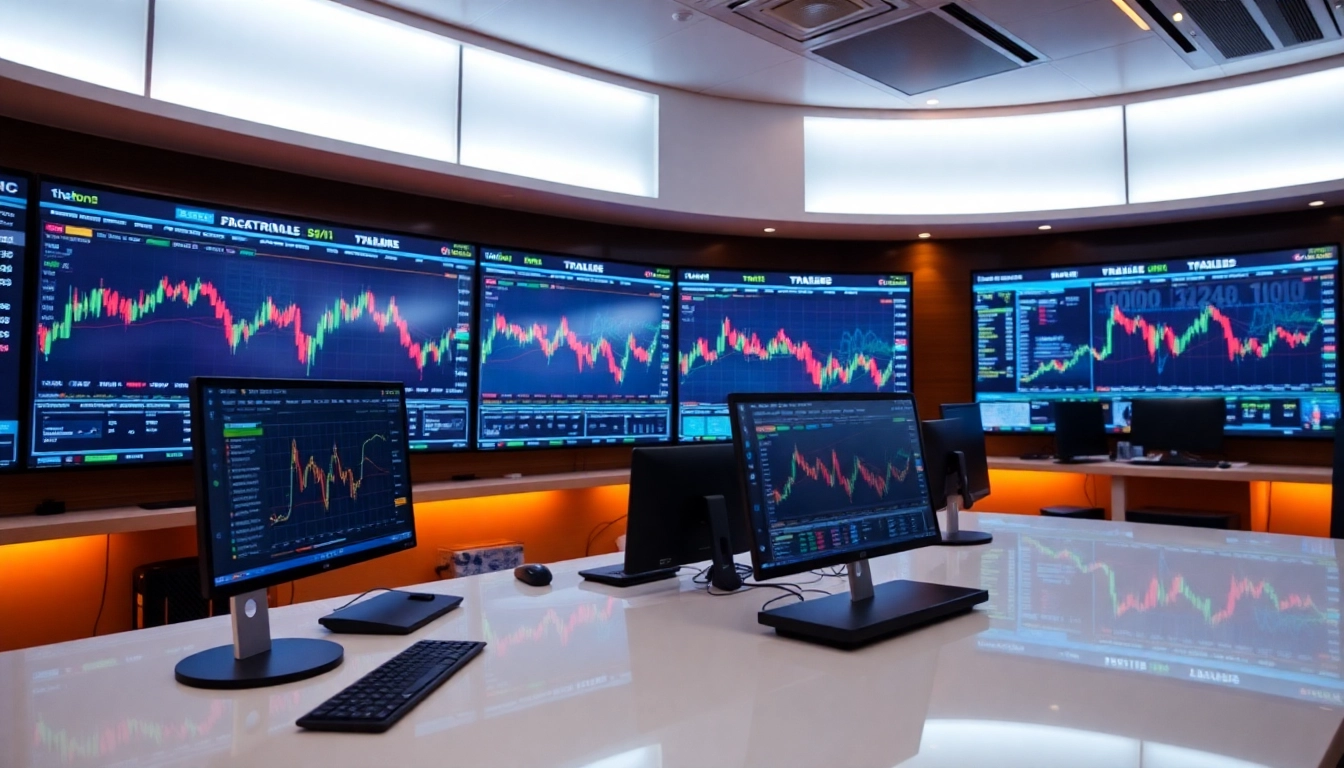How Trading News UK Shapes Investment Strategies and Market Insights
Understanding the Role of Trading News in UK Markets
In the fast-paced world of financial trading, staying ahead of market movements requires more than just a good grasp of technical analysis and economic fundamentals. An often overlooked yet critical component is the timely and accurate interpretation of trading news. Especially within the UK, where political developments, policy reforms, and economic indicators heavily influence market dynamics, leveraging up-to-date news can significantly enhance trading decisions. For retail investors and professional traders alike, understanding how to incorporate UK-specific trading news into their strategies is essential for managing risks and capitalizing on emerging opportunities. To explore this further, visit Trading News UK for comprehensive insights and real-time updates.
Importance of Timely News for Traders in the UK
Timeliness is paramount in trading. The financial markets respond rapidly to news, with prices often adjusting within seconds to new information. In the UK, key news events include economic data releases from the Office for National Statistics, Bank of England policy announcements, Brexit-related developments, and broader geopolitical shifts impacting UK assets. Missing the initial wave of news can result in missed profit opportunities or exposure to unforeseen risks. For instance, a sudden change in interest rate expectations can lead to sharp GBP movements, affecting currency trading and related asset classes. Therefore, traders must access real-time news feeds and develop a process for rapid analysis and decision-making.
Key Sources of Trading News UK for Retail Investors
Access to high-quality information is fundamental for effective trading. In the UK, reputable sources include the BBC Business News, Financial Times, Reuters UK, and The Guardian’s economic sections. Additionally, official releases from the Bank of England and UK government portals provide authoritative data. Many traders rely on specialized news services such as Bloomberg Terminal, Dow Jones, and TradingView, which offer real-time updates, alerts, and integrated analytics. Social media platforms like Twitter also present a wealth of immediate commentary, especially from financial journalists and analysts, but require careful evaluation for credibility.
Influence of News on Market Volatility and Decision-Making
Market volatility often spikes around major news releases, underscoring the importance of strategic planning. For example, an unexpected inflation report or negative geopolitical development can trigger rapid price swings that test traders’ risk management frameworks. Skilled traders interpret these movements not just as unpredictable chaos but as opportunities to adjust positions or initiate new trades based on anticipated market reactions. The influence of news extends beyond immediate price action; it shapes market sentiment, influencing long-term trends. Efficient analysis of news helps traders anticipate potential shifts, avoiding impulsive decisions born out of emotional reactions to volatile conditions.
Strategies to Leverage Trading News UK Effectively
Integrating News Feeds into Trading Platforms
Modern trading platforms allow seamless integration of news feeds, enabling traders to monitor relevant updates without leaving their trading environment. Using APIs from providers like Reuters, Benzinga, or Twitter feeds customized with sector-specific filters, traders can set up alerts for key events involving the UK economy. Automation tools can trigger trades based on predefined criteria, such as price gaps following a speech by the Bank of England governor or a sudden currency movement after political statements. The goal is to reduce latency, ensuring decisions are based on the freshest information possible.
Developing a News-Driven Trading Plan
A structured approach is essential for turning news into actionable insights. This involves establishing clear rules for entering, exiting, and managing trades based on specific news triggers. For example, a trader might decide to buy GBP/USD if UK inflation exceeds forecasts by a certain margin, or to short UK stocks if Brexit negotiations deteriorate unexpectedly. Incorporating risk controls like stop-loss and take-profit levels tied to news events minimizes exposure to unpredictable volatility. Regularly reviewing and backtesting this plan against historical news impacts helps refine strategies and build confidence.
Using Analytics to Interpret Trading News UK Data
Data analytics plays a pivotal role in translating raw news into meaningful trading signals. Natural language processing (NLP) algorithms can assess sentiment—positive, negative, or neutral—by analyzing news headlines, financial reports, and social media chatter. Quantitative models can correlate specific news types with asset movements, helping traders prioritize their focus. Combining these analytical tools with traditional technical analysis creates a comprehensive approach, improving the accuracy of predictions and reducing false signals. Continual learning and adaptation to new data patterns are crucial for staying competitive.
Best Practices for Staying Ahead in UK Trading News
Real-Time Updates and Alert Setups
Proactive traders leverage real-time alerts to react swiftly to market-moving news. Setting up customizable notifications for economic calendar releases, political speeches, or unexpected geopolitical events ensures immediate awareness. Many platforms support multi-channel alerts via email, SMS, or push notifications. Backtesting different alert configurations helps optimize response times, making sure that traders act on validated information rather than reacting to every minor fluctuation.
Monitoring Political and Economic Developments in the UK
UK markets are highly sensitive to political stability and policy changes. Regularly tracking parliamentary debates, government reports, and international negotiations helps anticipate potential market shifts. For example, a new legislation affecting financial services or a delay in Brexit implementation could significantly impact relevant asset classes. Developing a political calendar and subscribing to expert analysis enables traders to discriminate between impactful news and noise, ensuring their strategies remain aligned with the evolving macroeconomic landscape.
Evaluating News Credibility and Avoiding Misinformation
In the digital age, misinformation can spread rapidly, misleading traders and causing erroneous trades. Verifying news through multiple reputable sources and understanding the context is vital. Utilizing fact-checking tools, cross-referencing official releases, and prioritizing well-established media outlets help maintain credibility. Responsible traders avoid reacting impulsively to rumors or unverified reports, instead waiting for confirmation before adjusting their holdings.
Case Studies: Successful Trading News UK Applications
Example of a Market Surge Aligned with News Reports
An illustrative case involved the UK GDP data release, where unexpectedly strong growth figures prompted a surge in the GBP exchange rate. Traders who anticipated this move by monitoring economic indicators and used pre-set alerts capitalized on the rally, accruing significant short-term gains. The key was timely analysis—understanding the market consensus versus actual data—and swift execution using integrated trading systems.
Learning from Trading Failures Due to Poor News Analysis
On the flip side, traders who ignored political tensions surrounding Brexit negotiations faced severe losses when sudden developments caused sharp declines in relevant assets. Recognizing early signs of escalation, such as parliamentary deadlocks or diplomatic statements, might have mitigated the damage. This highlights the importance of continuous news monitoring and maintaining flexible trading plans that account for high-impact, low-probability events.
Tools and Platforms Favored by Professional Traders
Professionals commonly utilize platforms like Bloomberg Terminal, MetaTrader with integrated economic calendars, and proprietary analytical software. These tools combine real-time news, sentiment analysis, and customizable alerts, enabling traders to react efficiently. Additionally, AI-driven analytics platforms are increasingly adopted to parse large volumes of news rapidly, providing a competitive edge in the fast-moving UK markets.
Future Trends in Trading News UK and Market Impact
Emergence of AI-Driven News Analysis
Artificial intelligence is transforming how traders interpret news. Machine learning algorithms can rapidly analyze vast data streams, detect patterns, and predict market reactions with increasing accuracy. This allows traders to act on nuanced insights that are beyond manual analysis capabilities, ultimately leading to smarter, faster trading decisions.
Integration of Social Media and Alternative News Sources
Social media platforms like Twitter and Telegram are becoming essential for real-time news dissemination. Traders monitor feeds from trusted sources to capture spontaneous market sentiments and emerging geopolitical developments. Incorporating alternative news, such as financial blogs and forums, further enriches the information landscape, although careful vetting is essential to avoid misinformation.
Expected Regulatory Changes Affecting News Dissemination
As markets become more data-driven, regulators worldwide are scrutinizing news sources and trading practices. The UK may implement new rules to enhance transparency and curb misinformation, affecting how news is published and accessed. Traders should stay informed about these regulatory developments to ensure compliance and maintain the integrity of their trading operations.

